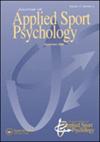The usefulness of the useless: How ritualized behavior improves self-control under competition pressure
IF 3.2
2区 心理学
Q2 HOSPITALITY, LEISURE, SPORT & TOURISM
引用次数: 0
Abstract
AbstractPre-match ritualized behavior have long been a topic of study in applied sport psychology. However, most of the above studies focus on pre-established rituals that make it difficult to explore the clear causal relationship of the ritualized behavior, particularly its underlying mechanisms. The aim of this study was to explore the effect of athletes’ ritualized behavior on self-control under competition pressure. One hundred and forty-six college athletes were recruited. This study used a two-factor between design 2 (competition pressure: low vs. high) × 3 (behavior type: ritualized behavior vs. random behavior vs. control group). Based on the Shooter-type Go/No-go task, the dependent variable was the average number of loops and the error rates of 10-meter air pistol task in virtual reality. We found that ritualized behavior had a moderate impact on the average number of loops [F(1, 140) = 5.13, p = .007, ηp2 = 0.068] and error rates [F(2, 140) = 11.29, p < .001, ηp2 = 0.139], and it was more beneficial for error rate under competition pressure [F(2, 140) = 3.18, p = .045, ηp2 = 0.043], while the symbolic meaning of ritualized behavior promotes self-control by improving self-efficacy and autonomous motivation via a top-down processing system. The psychological feature of ritualized behavior may serve as an important explanatory mechanism for its enhancing effect on self-control under competition pressure. This study supports and integrates the Precaution Theory and Self-determination Theory. In the future, researchers can design unique ritualized behaviors based on embodied cognition to help athletes in different sports groups.Lay Summary: In the arena, the audience cannot only see the athletes’ wonderful sports movements, but also, all kinds of ritualized behaviors. Through engaging in ritualized behavior as a “pregame booster”, athletes can improve self-control on shooting performance. Compared with the low-pressure situation, ritualized behavior was more beneficial for self-control under high competition pressure situations.PRACTICAL IMPLICATIONSAthletes can improve self-control on sports performance through enacting ritualized behavior. Moreover, under high competition pressure situations produces the greatest benefit.Sport psychology practitioners should try to understand psychological feature (symbolic meaning) as the most important component of athletes’ participation in ritualized behavior. Disclosure statementNo potential conflict of interest was reported by the author(s).Additional informationFundingThis work was Supported by the National Key Research and Development Program of China (No. 2019YFF0301600).无用之物的有用性:仪式化行为如何在竞争压力下提高自我控制能力
摘要赛前仪式化行为一直是应用运动心理学研究的课题。然而,上述研究大多侧重于预先建立的仪式,这使得难以探索仪式化行为的明确因果关系,特别是其潜在机制。本研究旨在探讨比赛压力下运动员仪式化行为对自我控制的影响。招募了146名大学运动员。本研究采用双因素设计2(竞争压力:低vs高)x3(行为类型:仪式化行为vs随机行为vs对照组)。基于射击型Go/No-go任务,因变量为虚拟现实中10米气手枪任务的平均循环次数和错误率。研究发现,仪式化行为对平均循环数(F(1,140) = 5.13, p = 0.007, ηp2 = 0.068)和错误率(F(2,140) = 11.29, p < 0.001, ηp2 = 0.139)有中等影响,而在竞争压力下对错误率的影响更大[F(2,140) = 3.18, p = 0.045, ηp2 = 0.043],仪式化行为的象征意义通过自上而下的加工系统,通过提高自我效能和自主动机来促进自我控制。仪式化行为的心理特征可能是其对竞争压力下自我控制增强作用的重要解释机制。本研究支持并整合了预防理论和自我决定理论。未来,研究人员可以基于具身认知设计独特的仪式化行为,以帮助不同运动群体的运动员。在竞技场上,观众不仅能看到运动员精彩的体育动作,还能看到各种仪式化的行为。通过将仪式化行为作为“赛前助推器”,运动员可以提高投篮表现的自我控制能力。与低压力情境相比,高竞争压力情境下仪式化行为更有利于自我控制。实践意义运动员可以通过仪式化行为来提高运动表现的自我控制能力。而且,在高竞争压力的情况下产生最大的效益。运动心理学从业者应该努力理解心理特征(象征意义)是运动员参与仪式化行为的最重要组成部分。披露声明作者未报告潜在的利益冲突。本研究受国家重点研发计划(No. 2019YFF0301600)资助。
本文章由计算机程序翻译,如有差异,请以英文原文为准。
求助全文
约1分钟内获得全文
求助全文
来源期刊
CiteScore
6.90
自引率
9.40%
发文量
39
审稿时长
>12 weeks
期刊介绍:
The Journal of Applied Sport Psychology (JASP) is a refereed journal designed to significantly advance thought, theory, and research on applied aspects of sport and exercise psychology. Submissions such as experimental studies, qualitative research, correlational studies, case studies, position papers, critical reviews, theoretical developments specific to applied research conducted in sport and/or exercise settings, or having significant applied implications to sport and exercise, are appropriate content for the JASP. Please see the recent Editorial for further details on the aims and scope of the journal. JASP is a non-proprietary journal that is an official publication of the Association for Applied Sport Psychology (AASP). The purpose of AASP is to promote the development of psychological theory, research, and intervention strategies in sport and exercise psychology. The Journal is a direct benefit of membership in AASP and is received by its student and professional members. The publisher of the JASP is Taylor and Francis, Inc. of Philadelphia, PA.

 求助内容:
求助内容: 应助结果提醒方式:
应助结果提醒方式:


